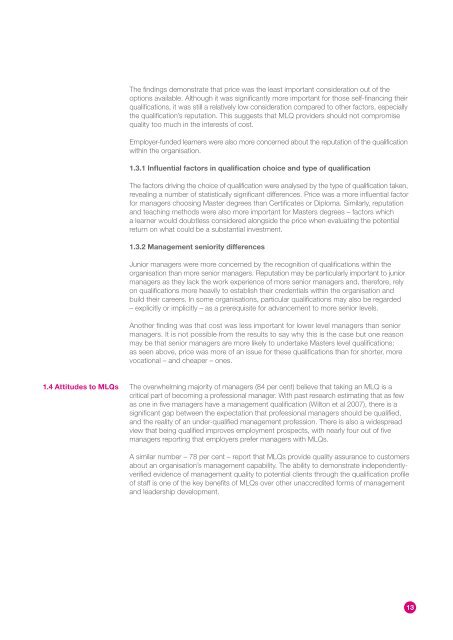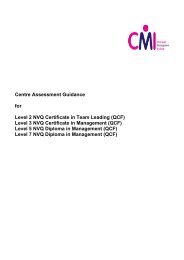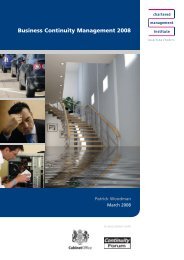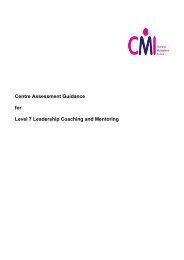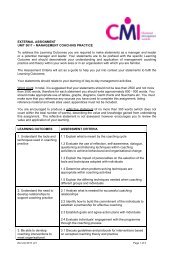The Value of Management and Leadership Qualifications
The Value of Management and Leadership Qualifications
The Value of Management and Leadership Qualifications
Create successful ePaper yourself
Turn your PDF publications into a flip-book with our unique Google optimized e-Paper software.
<strong>The</strong> findings demonstrate that price was the least important consideration out <strong>of</strong> theoptions available. Although it was significantly more important for those self-financing theirqualifications, it was still a relatively low consideration compared to other factors, especiallythe qualification’s reputation. This suggests that MLQ providers should not compromisequality too much in the interests <strong>of</strong> cost.Employer-funded learners were also more concerned about the reputation <strong>of</strong> the qualificationwithin the organisation.1.3.1 Influential factors in qualification choice <strong>and</strong> type <strong>of</strong> qualification<strong>The</strong> factors driving the choice <strong>of</strong> qualification were analysed by the type <strong>of</strong> qualification taken,revealing a number <strong>of</strong> statistically significant differences. Price was a more influential factorfor managers choosing Master degrees than Certificates or Diploma. Similarly, reputation<strong>and</strong> teaching methods were also more important for Masters degrees – factors whicha learner would doubtless considered alongside the price when evaluating the potentialreturn on what could be a substantial investment.1.3.2 <strong>Management</strong> seniority differencesJunior managers were more concerned by the recognition <strong>of</strong> qualifications within theorganisation than more senior managers. Reputation may be particularly important to juniormanagers as they lack the work experience <strong>of</strong> more senior managers <strong>and</strong>, therefore, relyon qualifications more heavily to establish their credentials within the organisation <strong>and</strong>build their careers. In some organisations, particular qualifications may also be regarded– explicitly or implicitly – as a prerequisite for advancement to more senior levels.Another finding was that cost was less important for lower level managers than seniormanagers. It is not possible from the results to say why this is the case but one reasonmay be that senior managers are more likely to undertake Masters level qualifications:as seen above, price was more <strong>of</strong> an issue for these qualifications than for shorter, morevocational – <strong>and</strong> cheaper – ones.1.4 Attitudes to MLQs<strong>The</strong> overwhelming majority <strong>of</strong> managers (84 per cent) believe that taking an MLQ is acritical part <strong>of</strong> becoming a pr<strong>of</strong>essional manager. With past research estimating that as fewas one in five managers have a management qualification (Wilton et al 2007), there is asignificant gap between the expectation that pr<strong>of</strong>essional managers should be qualified,<strong>and</strong> the reality <strong>of</strong> an under-qualified management pr<strong>of</strong>ession. <strong>The</strong>re is also a widespreadview that being qualified improves employment prospects, with nearly four out <strong>of</strong> fivemanagers reporting that employers prefer managers with MLQs.A similar number – 78 per cent – report that MLQs provide quality assurance to customersabout an organisation’s management capability. <strong>The</strong> ability to demonstrate independentlyverifiedevidence <strong>of</strong> management quality to potential clients through the qualification pr<strong>of</strong>ile<strong>of</strong> staff is one <strong>of</strong> the key benefits <strong>of</strong> MLQs over other unaccredited forms <strong>of</strong> management<strong>and</strong> leadership development.13


